Skoltech at Tochka Kipeniya presents: a lecture by Alexey Zaytsev
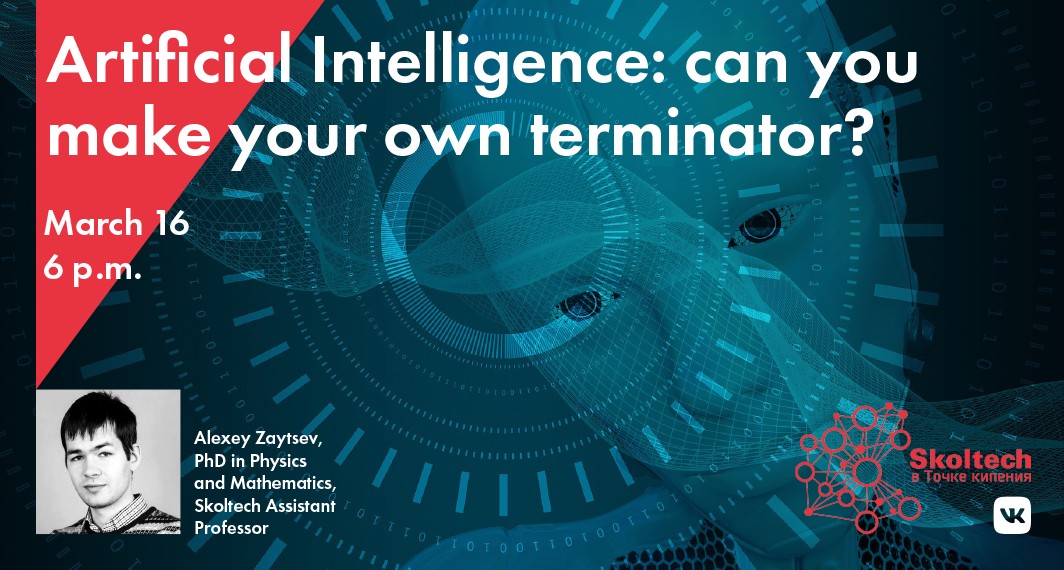 Twenty years ago, Artificial Intelligence (AI) could hardly compete with humans: it was a poor Go and chess player and had difficulty translating text or telling a cat from a dog in a photo. Today, AI outperforms humans in many tasks, excelling in chess and Go by making decisions beyond human comprehension. AI automates many routine processes, which suggests that it will soon learn to drive cars, trucks and farm machines, handle customer calls, wait tables, and do accounting.
Twenty years ago, Artificial Intelligence (AI) could hardly compete with humans: it was a poor Go and chess player and had difficulty translating text or telling a cat from a dog in a photo. Today, AI outperforms humans in many tasks, excelling in chess and Go by making decisions beyond human comprehension. AI automates many routine processes, which suggests that it will soon learn to drive cars, trucks and farm machines, handle customer calls, wait tables, and do accounting.
But is the current AI technology smart enough to replace humans? What are the risks of using AI? Where is the limit for its capabilities? What is on AI’s “mind” and how will it evolve over the next decade?
Alexey Zaytsev is a PhD in Physics and Mathematics, an Assistant Professor at the Skoltech
Center for Computational and Data-Intensive Science and Engineering (CDISE), and Head of the Skoltech-Sberbank Joint Laboratory (LARSS).
Offline at Moscow, Maly Konyushkovsky pereulok, 2, 3rd floor. Registration
A live stream of the lecture will be available at YouTube and VKontakte. Registration
Skoltech together with Juelich Research Center (Germany) will host an online CECAM/Psi-k flagship workshop “Materials Design for Energy Storage and Conversion: Theory and Experiment”.
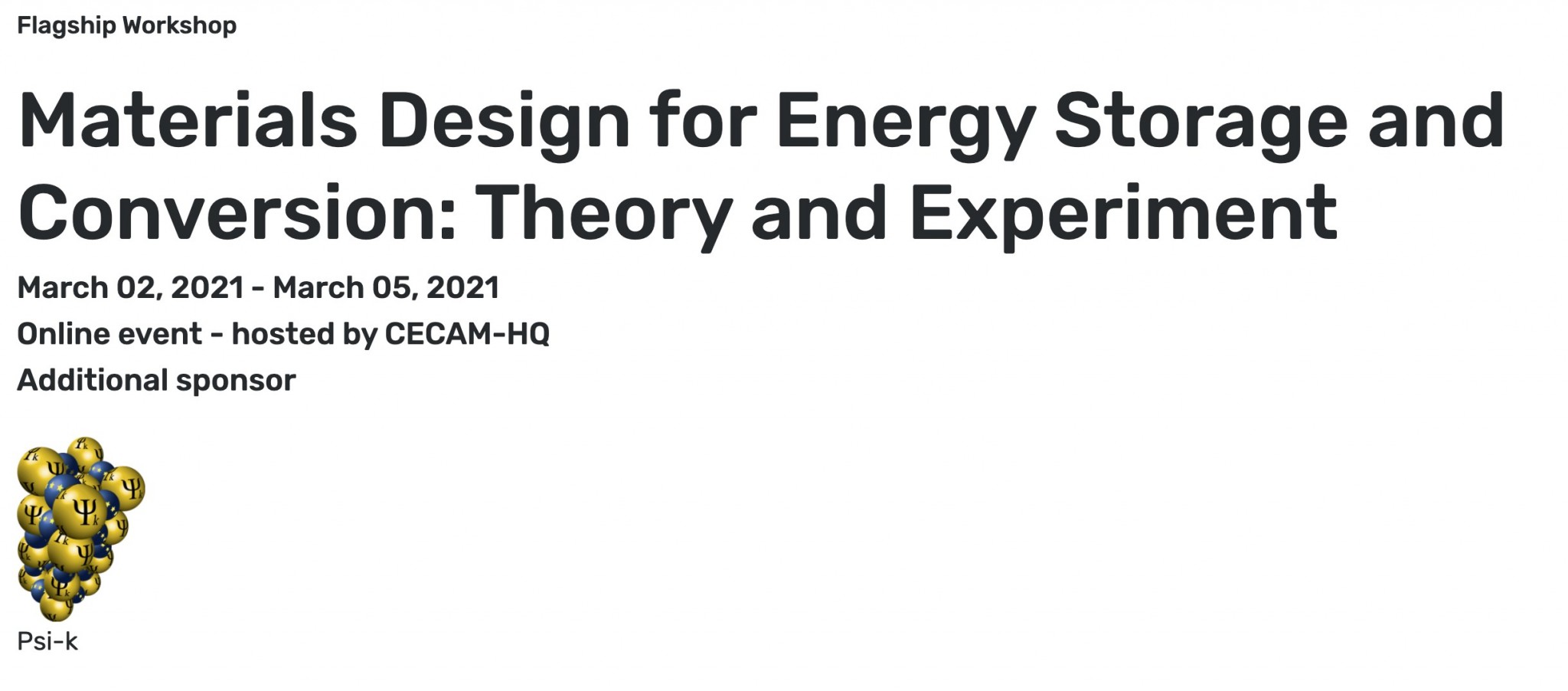
The workshop is aimed at bringing together theoreticians and experimentalists who are working on development of energy materials and systems. Recent advances in electronic-structure theory, continuum modelling, multiscale modelling, data analytics, as well as atomic-scale observation techniques will be presented and discussed. Applications of the theoretical and experimental methods for Li- and Na-ion batteries, all-solid-state batteries, solid oxide fuel cells, and (electro)catalysis will be presented. Several world-renowned scientists in the filed from around the globe, including Skoltech, will present invited lectures at the workshop.
The workshop will take place Online, on March 02 – March 05, 2021.
To participate in the workshop, please visit https://www.cecam.org/workshop-details/25 and click “participate”.
You will be transferred to CECAM login page, where you can either login or register. Once logged in, you will be able to request participation in this event. You will receive an email with the zoom link and instructions after formal approval of your participation by the organizers.
The deadline for registration is Sunday, February 28.
The Skoltech Lecture Hub at WSEC, a new science education project of the Skolkovo Institute of Science and Technology (Skoltech) at the Eurasian World-class Science and Education Center (Bashkortostan), launches a series of public lectures by Skoltech’s leading scientists.
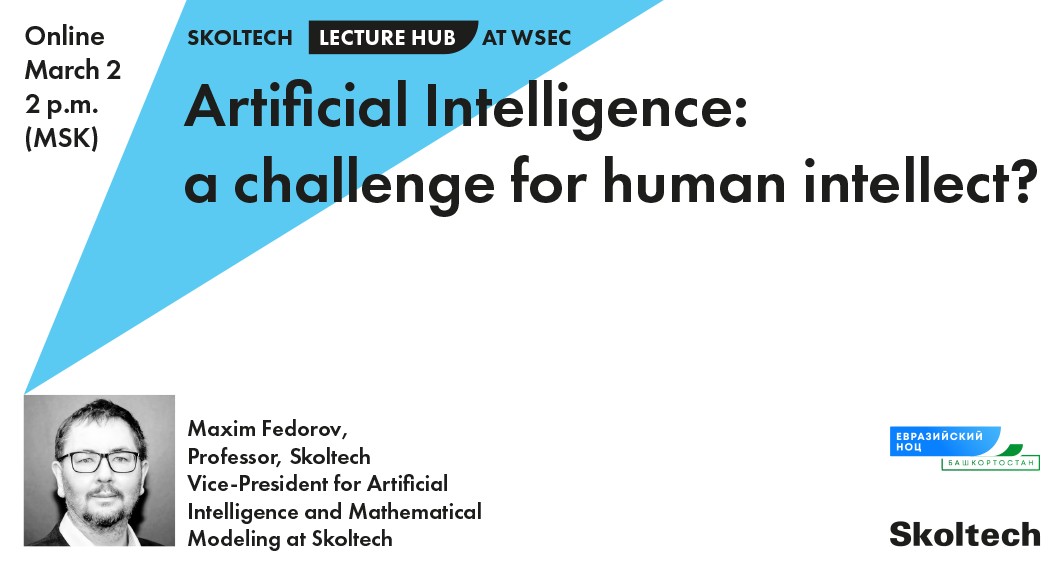
Nowadays, AI has become a fixture in advertising, medicine, automotive industry and even agriculture. This comes as no surprise, since AI handles many tasks in a better and much faster way than humans and helps to automate routine operations.
What are the prospects ahead for AI? Will computers replace humans, and if they do, when and what areas will they take over first? Can we create AI capable of dealing with a wide range of tasks without human support? How to avoid mistakes? What about the potential and risks of using IT? What regulatory issues come up with the advancement of AI?
About the speaker
Professor Maxim Fedorov is Vice-President for Artificial Intelligence and Mathematical Modeling at Skoltech and an expert in AI applications, High Performance Computing, and Data Science. He also serves as Executive Secretary of the Committee for Artificial Intelligence at the Commission of the Russian Federation for UNESCO.
Previously, he directed the supercomputer center at the University of Strathclyde in Glasgow, led research at the Max Planck Institute and the University of Duisburg-Essen, worked at University College Dublin, University of Cambridge, Kurchatov Institute, and Pushchino Science Center of RAS.
Maxim is a winner of the IAPWS Helmholtz Award and an author of over 100 publications, some of which became top 1% cited papers in their subject area.
To register use the link
Registration is now open for the First Russian Youth Internet Governance Forum (Youth RIGF) to be hosted by Skoltech on April 6, 2021. Undergraduate, graduate and PhD students, alumni and all those under 30 with an interest in IT are welcome to join the event.
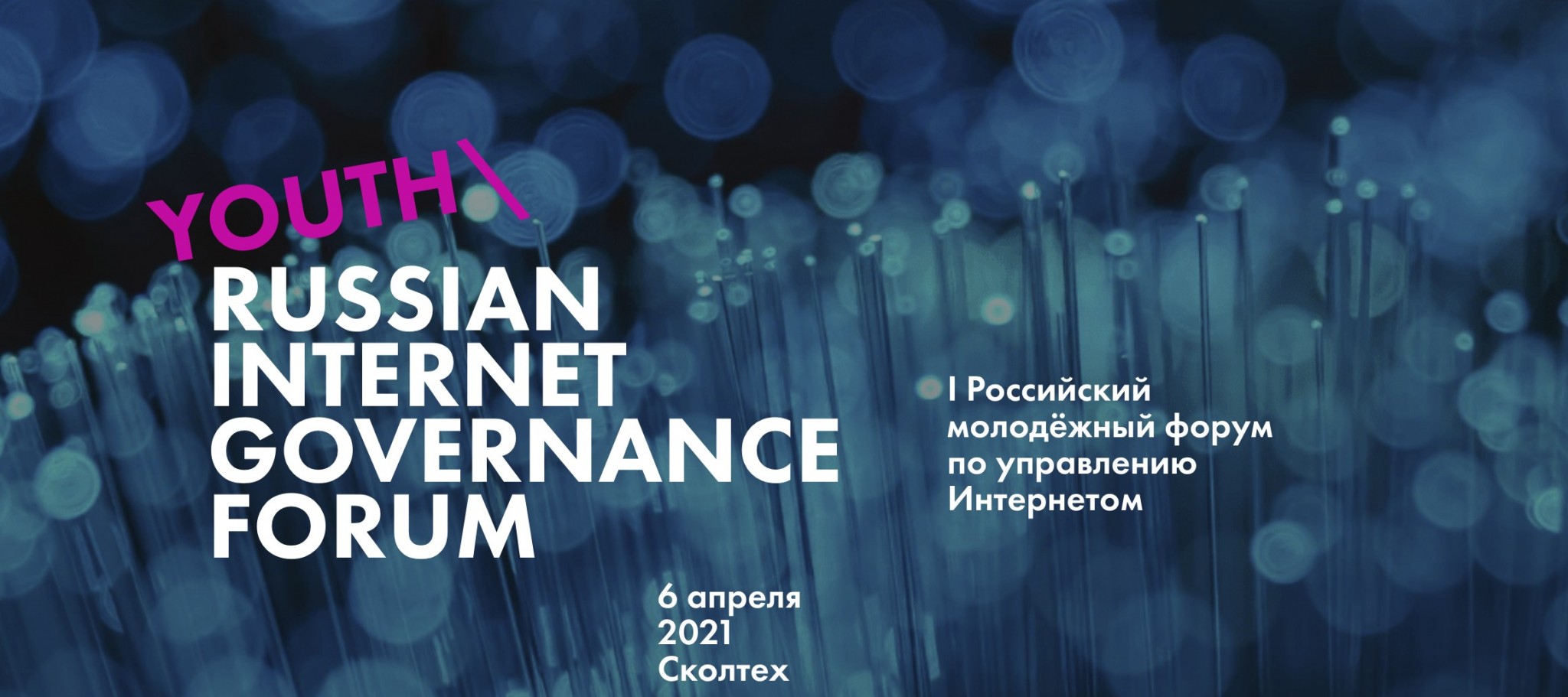
The participants will have the opportunity to meet IT experts, attend any of the RIGF’s four sections, discuss the future of the internet with famous bloggers and come up with ideas for youth messages to be formulated at the end of the Forum.
Key topics:
- (NON-)virtual reality
- Digital economy: utopia or dystopia?
- My personal data: who really owns it?
- 2020 as the year of TikTok: hype or major youth platform?
In addition, Youth RIGF’s fan zones will offer educational workshops and IT platforms with neural networks writing poetry and gadgets from the “good old days” eliciting heartwarming memories of childhood.
All registered participants will be able to attend master classes and other activities steered by our partners, and young IT professionals will compete for the Youth RIGF prize.
The tentative program and registration form can be found at http://youth.rigf.ru/
Skoltech Lecture Hub at ARHE presents a new online course of lectures: State-of-the-Art Mass Spectrometry.
Lecture 5: Molecular ecology.
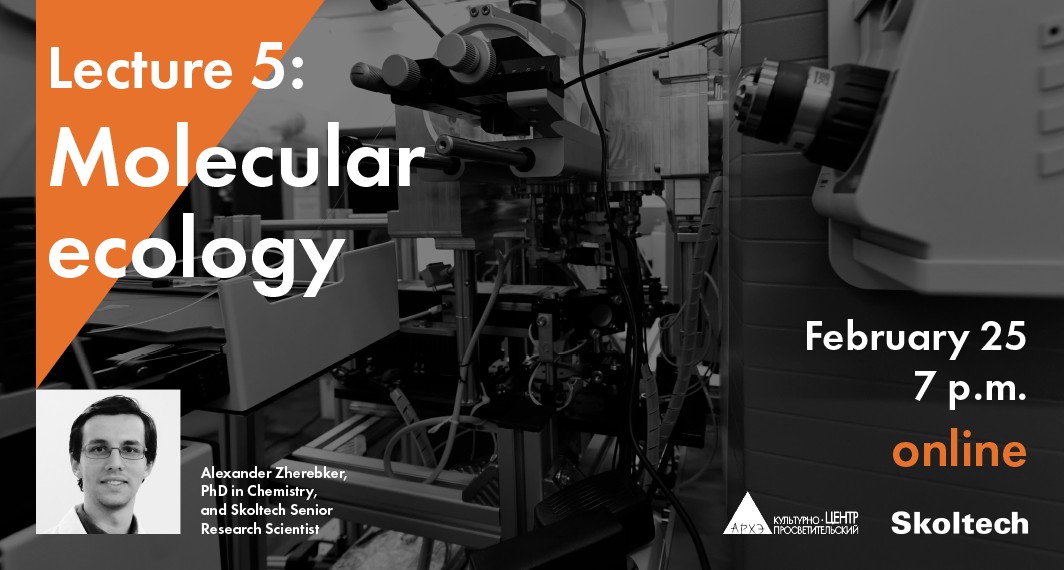
The mass spectrometer is a research instrument that ranks among the world’s greatest inventions. Mass spectrometry that helps weigh an individual molecule’s weight has become a fixture in doping research, medicine, ecology, and even museums.
Modern ecology and biogeochemistry show a clear trend towards multi-faceted study of diverse relationships and mutual influences between organisms and the environment. Molecular ecology methods help glean valuable information on the origin, diversity, and evolution of all ecosystem components, provide an insight into global natural processes and a possibility to predict and find ways to control changes in the living environment.
What is the natural carbon cycle like? What is natural organic matter composed of and how can mass spectrometry help in studying objects of nature? Why are some water reservoirs colored? How did carbon evolve and what is permafrost? What is oil made of? What do we know about extraterrestrial organic matter, meteorites, and lunar soil? Join Alexander Zherebker’s lecture to find out answers to these questions.
Speaker: Alexander Zherebker, PhD in Chemistry and Senior Research Scientist at the Skoltech Center for Computational and Data-Intensive Science and Engineering (CDISE).
Registration
 Twenty years ago, Artificial Intelligence (AI) could hardly compete with humans: it was a poor Go and chess player and had difficulty translating text or telling a cat from a dog in a photo. Today, AI outperforms humans in many tasks, excelling in chess and Go by making decisions beyond human comprehension. AI automates many routine processes, which suggests that it will soon learn to drive cars, trucks and farm machines, handle customer calls, wait tables, and do accounting.
Twenty years ago, Artificial Intelligence (AI) could hardly compete with humans: it was a poor Go and chess player and had difficulty translating text or telling a cat from a dog in a photo. Today, AI outperforms humans in many tasks, excelling in chess and Go by making decisions beyond human comprehension. AI automates many routine processes, which suggests that it will soon learn to drive cars, trucks and farm machines, handle customer calls, wait tables, and do accounting.


